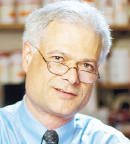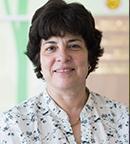The Basser Center for BRCA at the Abramson Cancer Center of the University of Pennsylvania, the world’s first comprehensive center aimed at advancing research, treatment, and prevention of BRCA-related cancers, is honoring Alan D. D'Andrea, MD, of Dana-Farber Cancer Institute, with the 2025 BRCA Impact Award, and Ephrat Levy-Lahad, MD, of Shaare Zedek Medical Center and the Hebrew University of Jerusalem, as the recipient of the 2025 Basser Global Prize.
BRCA Impact Award
Individuals with mutations in the BRCA1 and BRCA2 genes are at an increased risk of breast, ovarian, pancreatic, and prostate cancers. The BRCA Impact award was created to recognize a national leader in the field of cancer genetics and will be presented at the 14th annual Basser Center Scientific Symposium, taking place May 12 to 13, 2026.
“The BRCA Impact Award honors investigators whose insight and influence have profoundly advanced the science of cancer genetics,” said Susan M. Domchek, MD, Executive Director of the Basser Center for BRCA. “We are pleased to recognize Dr. D’Andrea, whose work continues to propel discovery that improves care for countless individuals and families.”

Alan D. D'Andrea, MD
Dr. D’Andrea is the Fuller-American Cancer Society Professor of Radiation Oncology at Harvard Medical School, the Director of the Center for DNA Damage and Repair, and the Director of the Susan F. Smith Center for Women’s Cancers at Dana-Farber Cancer Institute. He is internationally recognized for his BRCA research, and his work is leading to significant improvements in drug development and in clinical care for BRCA-related cancers.
Specifically, Dr. D’Andrea is known for unraveling the Fanconi anemia/BRCA pathway. His laboratory made the discovery that proteins encoded by the Fanconi anemia genes—which are associated with rare inherited bone marrow failure syndromes—act in a common pathway that intersects with BRCA1 and BRCA2. Biomarkers for this pathway have contributed significantly to the development of new anticancer drugs, such as PARP inhibitors. He also discovered two critical DNA repair targets, POLQ and USP1, required for the growth of BRCA1- or BRCA2-deficient tumors, leading to the development of new inhibitors currently being tested in clinical trials.
“It is my honor to receive this award from the Basser Center,” Dr. D’Andrea said. “I share the award with the families with inherited mutations BRCA1, BRCA2, and Fanconi anemia genes, who have been my close collaborators in my research.”
The BRCA Impact Award is supported by Shari Potter and Leonard Potter.
Basser Global Prize
Each year, the Basser Global Prize recognizes a leading scientist who has advanced BRCA1- and BRCA2-related research.
Dr. Levy-Lahad has been active in BRCA1 and BRCA2 research and clinical translation for 30 years, starting a few months after the cloning of BRCA1 and a few months before the cloning of BRCA2. She is one of the world’s leading experts on inherited breast cancer among Jewish women. Women and men of Ashkenazi Jewish ancestry have a 1 in 40 chance of carrying a BRCA1 or BRCA2 gene mutation—about a five times greater chance than that of the general population.

Ephrat Levy-Lahad, MD
“The Basser Global Prize recognizes scientists who are transforming our understanding of BRCA-related cancers and inspiring hope for the future,” said Dr. Domchek. “Dr. Levy-Lahad’s innovative work exemplifies the scientific excellence and collaboration that drives progress forward for individuals and families affected by BRCA mutations.”
Dr. Levy-Lahad received her medical degree from the Hebrew University-Hadassah School of Medicine. She completed an internal medicine residency at Shaare Zedek Medical Center in Jerusalem and a clinical and research fellowship in Medical Genetics at the University of Washington in Seattle. She is the founder and Robin Chemers Neustein Director of the Fuld Family Medical Genetics Institute at Shaare Zedek Medical Center, and a Professor of Internal Medicine and Medical Genetics at the Hebrew University of Jerusalem.
Her accomplishments include establishing for the first time that risks of breast and ovarian cancer are high among BRCA1 and BRCA2 mutation carriers identified from the general population—not just among carriers with a family history of cancer. This work provided the evidence base and impetus for implementing a free nationwide genetic screening program among Ashkenazi Jews in Israel, which has since expanded to include Ethiopian Jews. More than 60,000 women are now tested annually for BRCA1 and BRCA2 mutations. Dr. Levy-Lahad has also co-led the Middle East Breast Cancer Study (MEBCS) of newly diagnosed Palestinian breast cancer patients and their families, identifying features unique to this population.
“I am immensely honored to receive the Basser award,” said Dr. Levy-Lahad. “My hope is that it will further awareness of general testing of BRCA1 and BRCA2 mutations for prevention of breast and ovarian cancer.”
Dr. Levy-Lahad will give the keynote address at the 14th annual Basser Center Scientific Symposium.
The Basser Global Prize provides $100,000 in unrestricted support of the winner's BRCA1 and BRCA2-related research efforts, a Basser sculpture, and a $10,000 personal prize, which will be awarded at the symposium. The prize was established and endowed by Shari Potter and Leonard Potter. The Basser Center was established in 2012 by University of Pennsylvania alumni Mindy and Jon Gray in memory of Mindy and Shari’s sister Faith Basser, who died of ovarian cancer at age 44.

